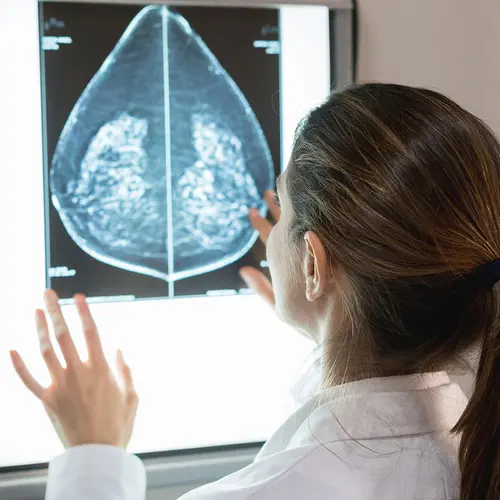When you were diagnosed with breast cancer, the tissue taken during your biopsy was likely tested for several biologic markers. Those results helped your doctor tailor your treatment. If the tissue was diagnosed as HER2-positive, that means that your cancer produced too much of a growth-promoting protein. About 15% of the 268,000 women living in the U.S. diagnosed with breast cancer each year fall into this group.
What Is HER2?
HER2, short for human epidermal growth factor receptor 2, describes a protein that plays a role in normal breast cell development. But in some breast cancers, the HER2 gene produces too many proteins, also called receptors, which spur the development of cancer, says Sara Tolaney, MD, a breast cancer oncologist at Dana-Farber Cancer Institute in Boston.
“The cancer cells have turned on lots of copies of the HER2 protein, and so it’s overexpressed on the cell,” she says. “Having all of those copies there is what’s driving the cell growth.”
To figure out if your cancer is HER2-positive, labs run tests to see if your tissue sample contains more HER2 genes than normal or is producing higher levels of HER2 protein. Your tissue also is tested for hormone receptors, such as whether it carries above-normal levels of estrogen or progesterone. Hormone-driven breast cancers are the most common type, affecting nearly three-fourths of women diagnosed.
Who Gets It?
Both men and women can develop HER2-positive breast cancers. Among women, those younger than age 50 are more vulnerable than older women for reasons that aren’t clear. No other risk factors have been identified, says Virginia Kaklamani, MD, a breast cancer oncologist and professor of medicine in the division of hematology/oncology at UT Health San Antonio.
In addition, “cancers that express HER2 tend to be more aggressive,” she says. “They grow faster.”
Treating and Monitoring HER2
Over nearly 2 decades, scientists have developed numerous drugs designed to thwart HER2, and more are in the works, Kaklamani says. “So people who get diagnosed with HER2-positive breast cancer have a pretty good chance of being cured.”
After treatment, if the cancer comes back or spreads to another part of the body, another biopsy should be done to check again for HER2 and other biologic markers, Kaklamani says. “In some cases, these receptors actually change,” she says, as the cancer evolves. In one study looking at HER2-positive patients whose cancer had spread outside the breast, researchers found that the cancer was no longer overproducing HER2 in 1 in 4 patients.
The chance of surviving if you’re diagnosed with a HER2-positive cancer nearly matches that for women with the more common hormone-driven type, the latest government health data shows. That’s the message Kaklamani passes along to her patients. “The good news is that we have very effective therapy.”
Find more articles, browse back issues, and read the current issue of WebMD Magazine.

